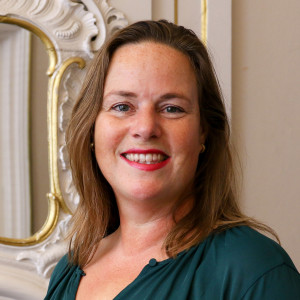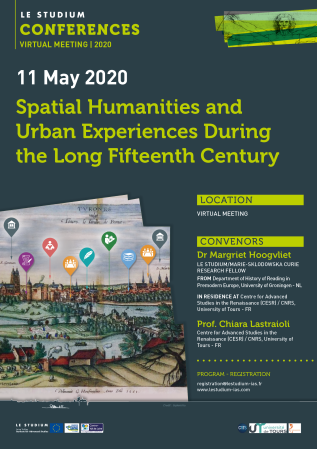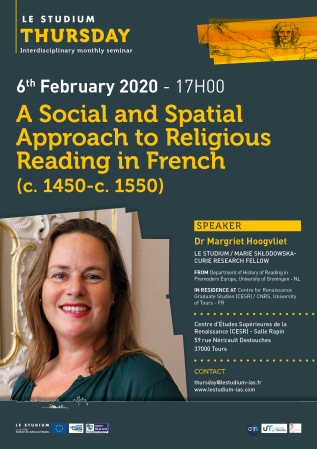Dr Margriet Hoogvliet

From
Department of History of Reading in Premodern Europe, University of Groningen - NL
In residence at
Centre for Renaissance Graduate Studies (CESR) / CNRS, University of Tours - FR
Host scientist
Prof. Chiara Lastriaoli
PROJECT
Religious "lieux de savoir" in premodern Tours and Orléans: A Social and Spatial Approach to Religious Reading in French (c. 1450-c. 1550)
Were ordinary French townspeople illiterate and without any knowledge of religious matters in the premodern period, just before the Reformation? And was France even then an exception when compared to the surrounding European regions? This project intends to show that up to ca. 1550 many of the inhabitants of “average” French towns as Tours and Orléans were literate and that they did have access to religious texts in French. Centuries-old documents from the historical archives, as well as surviving handwritten books and early prints will provide information about the wide range of social backgrounds of the readers, from a stocking maker in Orléans to well-off merchants and lawyers. The research will also aim to retrace how religious texts were disseminated through social networks connecting these readers. Furthermore, the religious reading activities by lay people in Tours and Orléans will also be analysed from a spatial perspective: What happened to a private home or workshop when it was also a space of religious reading? Reading activities, books, and book collections will also be studied as places of knowledge (lieux de savoir), where knowledge was created, stored, accessed, or disseminated. The historical data often allow plotting these places of knowledge on historical maps of premodern Tours and Orléans. Further analysis of these places of knowledge by making use of computerised Geographical Information Systems will allow for even more refined conclusions about concentrations and accessibility. The final results of the research will enable to show that religious reading by the laity in premodern France had many characteristics in common with other European areas.
Publications
Final reports
The research has shown to that up to ca. 1550 many of the inhabitants of “average” French towns as Tours and Orléans were literate and that they did have access to religious texts in French, contrarily to ideas regularly expressed in historical scholarship. Archival documents, as well as surviving handwritten texts and printed books have provided information about the wide range of social backgrounds of the readers, from stocking makers in Tours and Orléans, the grandson of Gaultiere who ran the public baths in Tours, to well-off merchants and lawyers. Next to books and their owners, the research has resulted in evidence about the presence and location of libraries, open access texts and books, booksellers and printers. Furthermore, an inventory of a book collection (probably a bookshop) with more than 276 books in French in Tours has given much data about textual cultures and reading interests. The historical data often allow plotting these “lieux de savoir” on historical maps of premodern Tours and Orléans. Further analysis of places of religious knowledge by making use of computerised Geographical Information Systems allow for more refined conclusions about concentrations (near religious institutions and schools) and accessibility (in the heart of urban life). The project has already resulted in one accepted peer-reviewed publication; two other articles and a collection of articles in open access, authored by specialists in the field, are in preparation.


